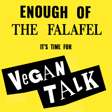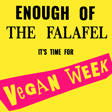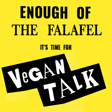
200- Illegal government elephant sales...and Mario Kart World drama!
We're back and covering as eclectic a range of stories as usual! Namibia's government seems to be doing some suspect selling of elephants to 'unknown' bidders, and Mario Kart World are under the spotlight for their 'Cow' character who has a nose ring; is it jewellery, or a reminder of bovine oppression? Freedom, Paul & Anthony are here to look at a dozen or so stories from the vegan & animal rights space from the last month or so, and have plenty to chew over.
****************
Enough of the Falafel is a community of people who love keeping on top of the latest news in the world of veganism & animal rights. With the Vegan Week podcast, we aim to keep listeners (& ourselves) informed & up-to-date with the latest developments that affect vegans & non-human animals; giving insight, whilst staying balanced; remaining true to our vegan ethics, whilst constantly seeking to grow & develop.
Each week we look through news stories from the past 7 days in the world of veganism & animal rights.
If you spot any news stories that might catch our fancy, or have an idea for a discussion topic, get in touch via enoughofthefalafel@gmail.com.
*******************
This week's stories:
https://www.bbc.co.uk/news/articles/cr74340v9p8o
https://nypost.com/2025/08/11/us-news/animal-rights-activists-target-vogue-editors-at-their-homes/
https://wildbeimwild.com/en/animal-rights-groups-call-for-a-global-ban-on-fur-farms/
https://plantbasednews.org/lifestyle/health/vegan-nun-medal-powerlifting-competition/https://plantbasednews.org/lifestyle/health/vegan-nun-medal-powerlifting-competition
https://www.news-medical.net/news/20250729/Vegan-teens-exercise-more-often-than-meat-eating-peers-study-finds.aspx
https://www.v2radio.co.uk/news/west-sussex/tui-at-gatwick-airport-targeted-by-animal-rights-group-peta/
https://www.cbc.ca/player/play/video/9.6873832
https://wildbeimwild.com/en/export-of-42-wild-namibian-elephants-causes-a-stir/
https://www.theguardian.com/world/2025/aug/17/supermarkets-suspend-supplies-from-lincolnshire-pig-farm-after-covert-filming-of-animal-abuse
https://www.theanimalreader.com/2025/08/05/man-smuggles-600-baby-red-footed-tortoises-in-suitcases/
https://www.theanimalreader.com/2025/08/18/colombia-lab-that-abused-night-monkeys-is-shut-down/
https://www.theanimalreader.com/2025/08/12/protests-grow-as-india-court-orders-removal-of-all-stray-dogs-from-delhi-streets/
https://plantbasednews.org/lifestyle/food/eleven-madison-park-reintroduces-meat/
****************
Thanks everyone for listening; give us a rating and drop us a message to say "hi"; it'll make our day!
Freedom, Paul & Ant


